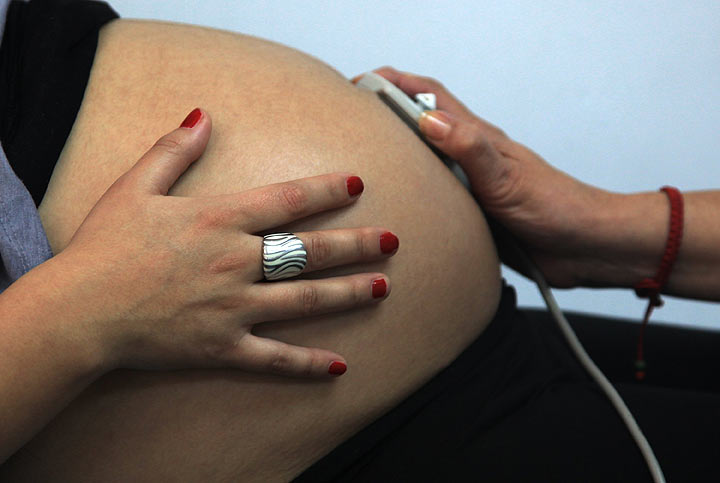As Hamilton continues to lag behind 30 other Ontario public health units in COVID-19 vaccination rates, a local OB-GYN says he’s seeing more ‘troubling’ metrics among would be mothers hesitant to get vaccinated.

McMaster University OB-GYN chair and Hamilton Health Sciences (HHS) obstetrician Dr. Jon Barrett says a heightened concern for what’s being put into their bodies appears to be the driver of an inoculation rate lower than 60 per cent among soon to be moms.
“There are always extra concerns about what you’re doing, what you’re eating, the drugs you’re taking, the medications, that’s normal for pregnancy,” Barrett told Global News.
“I think it’s no surprise that pregnancy comes with heightened concerns for something that they are putting into their bodies.”
As of Oct. 3, 68 per cent of women reported as pregnant at the time in Ontario had at least a single dose of a vaccine, while only 60% report being fully vaccinated.
Hamilton ranked 12th on the list 34 public health units in the province with only 59 per cent fully vaccinated. Niagara ranked even worse behind 26 other regions with a rate of only 49 per cent fully vaccinated.
The numbers pale in comparison with overall vaccination rates in the province as over 84 per cent of the total population have been fully vaccinated as of Oct. 26, with Hamilton and Niagara at 81 per cent and 85 per cent respectively in two doses.
Public Health Ontario estimated that 79 per cent of all individuals with high-risk conditions on Oct. 3 were with child. It’s a number Barrett says is due to the sheer number of women that have gotten pregnant during a recent resurgence in conception.
The province’s birth rate dropped in the first quarter of 2021 to about 0.9 per cent compared to the average rate for 2020, which was about 1.3 per cent.

Get weekly health news
Barrett expects that number, when released, will go up as he and his colleagues experienced a noticeable surge within the last six months.
“What I think happened is initially when the pandemic struck, people put pregnancy plans on hold,” Barrett said.
“So there was a drop and then people have said, well, we have to live life in a way that we can’t put everything on hold forever.”
From March 2020 to August 2021, HHS reported 25 hospitalizations involving pregnant women with COVID-19.
Last week, a New Brunswick Medical Society (NBMS) study revealed pregnant individuals are four times more likely to be hospitalized if they contract COVID-19, and 40 percent more likely to be admitted to the ICU.
“The biggest challenge is the fact that you’re caring for two patients, not just one,” said Dr. Mark MacMillan, president of the NBMS.
Another study from JAMA Pediatrics published in April said of 706 COVID cases involving pregnant women from around the world, adverse outcomes included maternal mortality, premature labour and preeclampsia — a pregnancy complication that can damage another organ system, most often the liver and kidneys.
“It’s a symptom of pregnancy associated with high blood pressure, but really, it’s a multisystem disease,” said Barrett.
“Because COVID is a multisystem disease or can become one, the illness, looks like what in fact has become preeclampsia.”
Hamilton’s medical officer of health says she understands the concerns of mothers wanting to do the best for their growing child but says information connecting infertility with the vaccines are simply not true.
“It doesn’t have any scientific basis,” Dr. Elizabeth Richardson told Global News.
“We’ve not seen it in the millions and millions of doses that have been administered now worldwide. It’s really important that pregnant women talk to their caregivers.”
Haldimand Norfolk’s acting medical officer of health admitted in a recent media op that he’s witnessed the effects of COVID on pregnant women during his stint as an Intensive Care (ICU) doctor at Guelph General.
Dr. Matt Strauss said during his 10 years as an acute care doctor he had only seen one to two pregnant women per year come into an ICU for non-COVID care, and dozens over his 17 years in medicine.
During the third wave in April, before vaccines were readily available, he saw two pregnant women in ICU gravely ill with COVID-19.
“Both were young and perfectly healthy,” said Strauss.
“Their significant risk factor was their pregnancy and they were both unvaccinated.”
Straus revealed that his wife was “very very uninterested” in getting pregnant after hearing his story, but has since done so after being fully vaccinated.
“So if you are pregnant or thinking of becoming pregnant, I urge you to get vaccinated. If you have questions about those recommendations book an appointment with a health care provider you trust.”
Canada’s National Advisory Committee on Immunization recommends that a full vaccine course be offered to pregnant individuals.
The agency insists any of the four well-known authorized vaccines are effective — Pfizer-BioNTech, Moderna, AstraZeneca, and Johnson & Johnson – but recommends the two mRNA vaccines, Pfizer or Moderna.
Barrett says there is “no panacea” that will 100 per cent protect anyone against COVID-19 and that all the other public health measures, like masking and distancing, should still be followed pre- and post-birth.
“But there’s no reason to hold off on vaccination either before pregnancy and certainly postpartum. It doesn’t affect breastfeeding and there shouldn’t be any change in behaviour,” said Barrett.












Comments